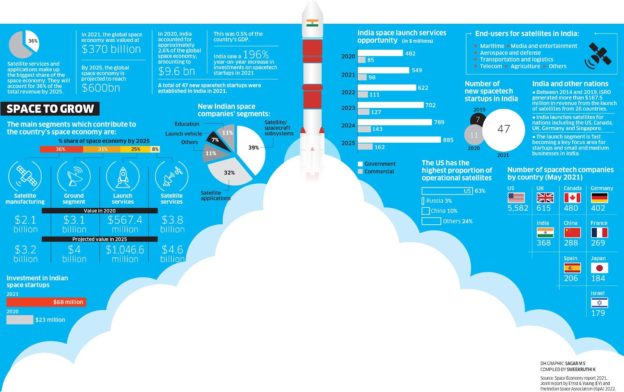The space sector can create more than a million jobs in the coming years. The foundation for the enterprises that will generate these jobs must be built at the school level itself.
On April 6, the Union Cabinet approved the Indian Space Policy 2023. Prime minister Narendra Modi had earlier taken the pathbreaking decision to open the space sector for private participation and there are already 150 startups working with ISRO today. The Indian Space Policy aims to increase department of space’s role of boosting ISRO mission activities with a greater participation planned for research, academia, startups, and space industry. The government had already opened up through the government route, FDI in the space sector up to 100% around satellite establishment and operations.
These are great initiatives and the underlying question is whether India can leverage this and become the next global space capital, and if we are geared to address the demand of more than a million jobs over next decade. Global space development has been accelerated significantly through private sector participation and projections from Morgan Stanley indicate a $1 trillion space economy by 2040.
Space startups, space parks, and satellite manufacturing services will play a major role in boosting the Indian space economy, which is projected to grow to $12.8 billion by 2025. This is possible with the contribution of the Indian startup ecosystem for space. Though the ecosystem started late, it is growing fast. PM Modi had announced the ‘iDEX 75 Space Challenges’ during the Defence Expo to encourage and promote space tech startups.
In 2020, India accounted for approximately 2.6% of the global space economy, amounting to $9.6 billion. The Indian space programme is boosted by the realisation of indigenous technology, facilities, systems, and rollout of services in a systematic manner. Satellite broadcasting services have benefited a large part of the population, and served the media and entertainment industry.
If India were to potentially look at having a large share of the million potential jobs, we need to start building its foundations at the school level by triggering a level of fascination and attraction to space technology. Sadly, many of our students today do not even know of the history and work ISRO has done over time and their successful missions. This warrants the need for space education articulated through experiential learning. This would have an extremely positive impact on science education by making STEM education with space study inclusive. The technical know-hows should be encouraged right from school level as students these days tend to make career decisions early and understanding of space ecosystem opportunities is of paramount importance. This also aligns with the New Education Policy guidelines. A focus on astronomy and space from the government will have a long-lasting impact on India’s potential to become one of the leading space tech countries.
ISRO has also unveiled a project meant for teaching space sciences to the young generation named ‘Antriksh Jigyasa’, which literally translates to ‘Space Curiosity.’ It has been designed as a knowledge and information-extensive portal for students wherein they can attain space education and even explore space technology at large. This platform also enables students to find out the applications of space science in STEM field learning followed by online courses. There are courses like Shiksha Gagan, Overview of Space Science and Technology, Space Quiz, Antriksh Navacharare, and others.
It is also interesting to see startups like Navars Edutech emerging in this space offering comprehensive education in astronomy and space science to K12 students through technology, pedagogy, innovation & industry partnerships. It has industry collaborations with Skyroot Aerospace (Student Satellite launch partner), ISRO (Space Tutor Program), global astronomy associations and more. They offer a comprehensive education of astronomy, space, and aerospace to school students. The Navars Astronomy Lab program is powering a large number of schools to bring space education to students with a defined pedagogy and a sustained progressive curriculum. This would lead to capacity building at the college level to build the ecosystem of space engineers addressing design, engineering, data analytics, launch, and research domains, addressing to fill the potential million jobs in the next decade.
Also read: Why is India looking at Colombia?
Currently, the Atal Tinkering Lab programmes are mostly focused on enabling robotics at about 10,000 schools. This programme needs a strong face lift to focus on space as STEM and robotics are getting integrated in the space education programmes being offered to school by space edtech companies. The Atal Incubation Centres are a step in the right direction and increasing the grant amounts for space-related activities will further encourage many potential entrepreneurs to take the plunge.
The capabilities being built by the private space sector complement the leadership that the Indian government has been demonstrating. With India already being a cost-efficient and reliant player in the space sector, private sector participation will further the momentum and add the much-needed impetus to this sector over the next decade if promoted at the school and college levels.
Writers are respectively, CEO, Indiatech.org, and co-founder, Navars Edutech
https://www.financialexpress.com/opinion/the-next-frontier-for-enterprise/3056218/





